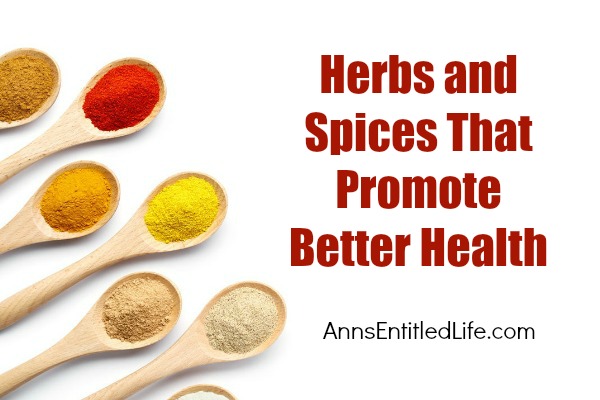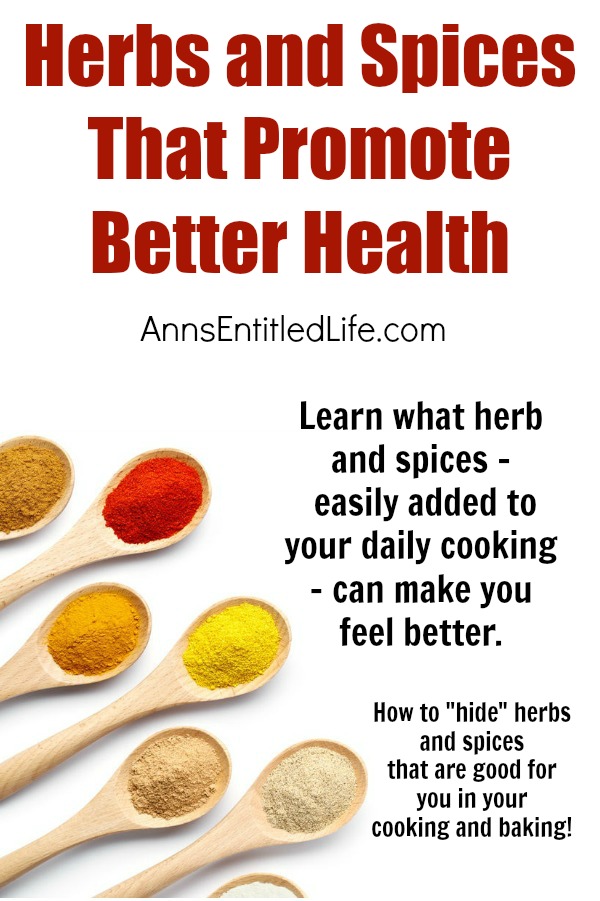Herbs and Spices That Promote Better Health
So many ailments, discomforts, and illnesses that we have developed in our culture can be improved with changes in diet. Removing fried foods, white bread and pasta, soda, and other unhealthy foods can not only help you lose weight and feel better but it can possibly reverse or at least improve many illnesses. These are obvious ways to make changes in your diet to improve overall health but you can also add things to your food diet that will make a big impact overall or use them to specifically help with the symptoms of a specific ailment. Here are gathered here 10 favorite medicinal herbs and spices that can be mixed into your favorite foods and drinks to help promote better health!
10 Herbs to add to Your Pantry:
● Basil – This innocent and flavorful herb is chock full of disease fighting antioxidants, is thought to help fight cancer, helps detox, and alkalizes your body- improving digestion. Many people use Bail to treat nausea, motion sickness, indigestion, constipation, respiratory problems Basil can also help relieve congestion and is antibacterial. Use fresh, dried, and Basil Essential Oil in just about every savory dish you can think of to improve flavor! This herb is pretty easy to grow in a windowsill, garden or outside in a large pot. How To Harvest and Dry Basil
● Cinnamon – Cinnamon is an ancient herb thought to help with a variety of ailments including gastrointestinal problems, relieving symptoms of colds and flu. There is not much that cinnamon doesn’t add wonderful flavor too from sweet to savory, desserts to dinner. Add it to baked goods, tea, coffee, savory dishes, and more. Cinnamon helps you feel full and reduces cravings (some studies have shown it can help stabilize blood sugar). Cinnamon also makes a fantastic ingredient in homemade masks and scrubs- encouraging blood flow and brightening your complexion. And the scent? Yum! Everything smells better with cinnamon! How To Scent Your House Naturally
● Cloves – Clove has the highest antioxidant level of foods according to ORAC (Oxygen Radical Absorbance Capacity). While the make a pretty and fragrant way to stud your ham many people use clove in its oil form dabbing a drop right on a toothache. Add clove to soups, curries, and other main dishes to reduce inflammation, aid in digestion, and as a natural expectorant.
● Garlic – When my mother had her heart attack, her cardiologist advised her to take garlic pills as he firmly believed they helped with bad cholesterol, and took them himself daily. WebMd lists these other properties for garlic including: Garlic is used for many conditions related to the heart and blood system. These conditions include high blood pressure, low blood pressure, high cholesterol, inherited high cholesterol, coronary heart disease, heart attack, reduced blood flow due to narrowed arteries, and “hardening of the arteries” (atherosclerosis). Some people use garlic to prevent colon cancer, rectal cancer, stomach cancer, breast cancer, prostate cancer, multiple myeloma, and lung cancer. It is also used to treat prostate cancer and bladder cancer.
● Ginger – You probably already know that ginger is great for various forms of nausea. Ginger is considered a powerful anti-inflammatory herb. Ginger can also aid in relief of menstrual cramps and migraines. It is such a wonderful help for digestive health that it can help combat a wide range of issues that stem from your gut health. Add it to smoothies, savory dishes, in drinks, soups and more (even in your shampoo for stronger hair) fresh, dried, or in oil form. Carrot Ginger Juice Power Punch.
● Lavender – According to the University of Maryland Medical Center, a number of studies have reported that lavender essential oil may be beneficial in a variety of conditions, including insomnia, alopecia (hair loss), anxiety, stress, and postoperative pain. Try growing your own lavender or buy dried flowers or Lavender Essential Oil in the store to create sachets that help you sleep. Use it to create simple syrup and add it to lemonade for a refreshing treat that is soothing. Use oil to treat burns, eczema, and to slow aging. Inhale fresh, dried or oil form for headaches and a mood elevator or mix into bath soaks and soaps to reduce tension and soothe.
● Mustard – What? You thought it was just a yummy condiment right? So did I until I started researching healthy foods. This ancient spice promotes digestion, is an anti-inflammatory, and is full of antioxidants. One tablespoon of mustard seed has 21% of our recommended daily allowance of selenium-which helps regulate thyroid. So the next time you bite into a sandwich with a bunch of spicy mustard remember it.
● Oregano – While it adds a delicious Italian flavor to many dishes it is also considered medicinal in that it is thought to be a natural antibiotic helping to fight against infections. Oregano in dried, fresh, or oil form stimulates appetite, kills intestinal parasites, and can break up nasal congestion. Include it in everything from your favorite homemade pizza to vegetable soup. The oil also makes a great wart remover.
● Peppermint – Ah peppermint, it’s not just for freshening breath or dressing up your tea. Peppermint is an extremely popular herb with several helpful benefits such as soothing upset stomachs from nausea or motion sickness, improving bowel syndrome, reduce gas, and is thought to reduce hay fever symptoms. You can crush leaves and add them to your tea or other drinks as well as inhale or rub the leaves gently on your temple to relieve headaches. Every home should have a peppermint plant or two – but in a pot. Because like all mints, peppermint will spread and take over a garden.
● Turmeric – This powerful herb is the base for curries and where mustard gets its color from, but the benefits do not stop there. Turmeric is a wonderful anti-inflammatory, anti-depressant, and anti-diabetic, It is great in aiding with weight loss, lowering cholesterol, helps boost your immune system, aids in digestion, it reduces joint pain, and can be used to reduce coughing and asthma symptoms. This is a must have in your pantry as well as on your medicine shelf-it can be used in cooking, smoothies, and teas as well as in supplement form. Turmeric is fat soluble so it is best taken with a fat.
If you are looking to improve the quality of your health and symptoms try intentionally adding these medicinal herbs and spices to your diet, beauty products, or naturally allow them in your home in sachets or warmers.
Sources:
● University of Maryland Medical Center
● WebMD
● Medical News Today
Note: None of this is meant as medical advice. I am not a doctor, and do not play one on the internet. Please consult a physician if you have any questions about cooking or baking with herbs so your doctor can better explain to you the benefits, possible side effects, and any warnings about cooking or baking with herbs.
● Essential Oils to Use in Your Baking
● For more Recipe posts on Ann’s Entitled Life, click here.
● If you enjoyed this post, be sure to sign up for the Ann’s Entitled Life weekly newsletter, and never miss another article!


Leave a Reply